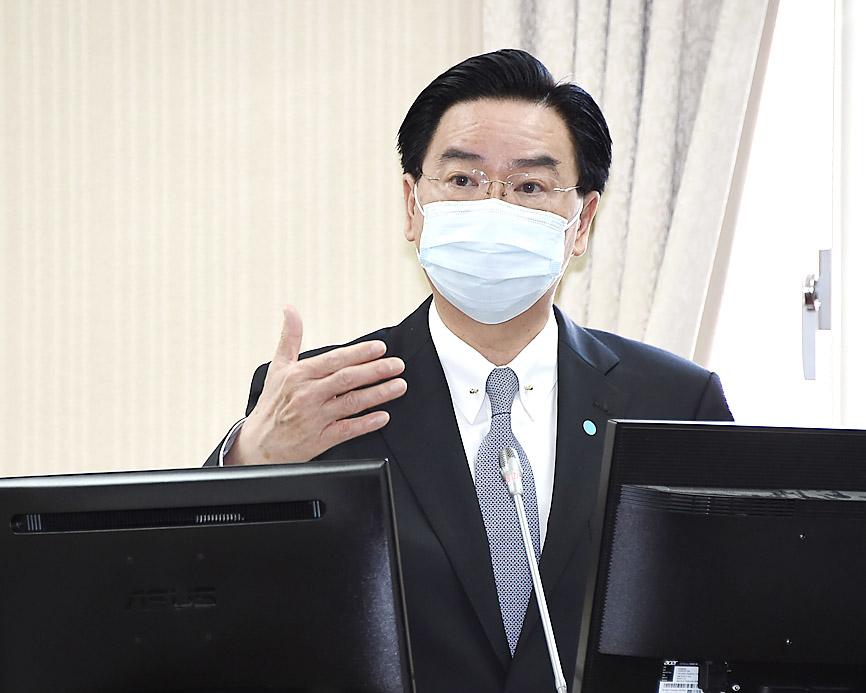Taiwan must be prepared to defend itself, Minister of Foreign Affairs Joseph Wu (吳釗燮) said yesterday after documents reportedly showed that Chinese President Xi Jinping (習近平) had considered invading the nation in the fall.
In a post on Facebook dated Thursday last week, exiled Russian dissident Vladimir Osechkin, who founded the France-based human rights group Gulagu Net, referenced the documents, which are purportedly leaked Russian intelligence.
“Xi Jinping was at least considering taking over Taiwan in the fall — he needs his own little victory to get re-elected for a third term — there the struggle within the elite is colossal,” Osechkin wrote, citing the documents.

Photo: Tu Chien-jung, Taipei Times
“Now, after the Ukrainian events, this window of opportunity has been closed to him, which gives the United States the opportunity to both blackmail Xi and negotiate with its competitors on favorable terms,” he wrote, quoting what the documents showed was an analyst writing for the Russian Federal Security Service.
Wu told reporters: “I cannot ascertain [the documents’] veracity, but we must be prepared to defend ourselves regardless of if or when China intends to attack.”
Separately, Ministry of National Defense spokesman Major General Shih Shun-wen (史順文) declined to comment on the matter, saying only that the military continues to monitor Chinese actions closely and is preparing as necessary to defend national security.
At a meeting of the legislature’s Foreign Affairs and National Defense Committee yesterday, Chinese Nationalist Party (KMT) Legislator Johnny Chiang (江啟臣) asked Wu whether the government has made plans to defend Taiwan without direct US military support, as a recent poll suggested that many Taiwanese are skeptical about Washington’s commitment.
A poll conducted by the Taiwan Center for International Strategic Studies on Tuesday showed that 47 percent of respondents do not believe that the US is sincere in its promises to assist Taiwan with its defense.
Wu said that the government’s consistent policy is for Taiwan to defend itself and that it is poised to announce new arms deals with the US.
Washington believes that giving Taiwan weapons is necessary for self-defense as a part of its legal obligations under its Taiwan Relations Act, he said.
Moreover, it has engaged Taiwan in discussions on security arrangements and is deploying forces to exclude threats from the Indo-Pacific region, he added.
Later yesterday, Shih said that the defense ministry would brief the public after the US Defense Security Cooperation Agency officially notifies the US Congress of any new arms sales to Taiwan.
In related news, President Tsai Ing-wen (蔡英文) in her capacity as Democratic Progressive Party chairperson told the party’s Central Standing Committee that her administration would press on with the development of dual-use technologies to bolster the armed forces and Taiwan’s defense industry.
The government is committed to developing and improving the nation’s capability to efficiently mobilize civilian resources during war, including taking stock of the country’s food, fuel and industrial capabilities, Tsai said.
Additional reporting by Aaron Tu

INVESTIGATION: The case is the latest instance of a DPP figure being implicated in an espionage network accused of allegedly leaking information to Chinese intelligence Democratic Progressive Party (DPP) member Ho Jen-chieh (何仁傑) was detained and held incommunicado yesterday on suspicion of spying for China during his tenure as assistant to then-minister of foreign affairs Joseph Wu (吳釗燮). The Taipei District Prosecutors’ Office said Ho was implicated during its investigation into alleged spying activities by former Presidential Office consultant Wu Shang-yu (吳尚雨). Prosecutors said there is reason to believe Ho breached the National Security Act (國家安全法) by leaking classified Ministry of Foreign Affairs information to Chinese intelligence. Following interrogation, prosecutors petitioned the Taipei District Court to detain Ho, citing concerns over potential collusion or tampering of evidence. The

‘FORM OF PROTEST’: The German Institute Taipei said it was ‘shocked’ to see Nazi symbolism used in connection with political aims as it condemned the incident Sung Chien-liang (宋建樑), who led efforts to recall Democratic Progressive Party (DPP) Legislator Lee Kun-cheng (李坤城), was released on bail of NT$80,000 yesterday amid an outcry over a Nazi armband he wore to questioning the night before. Sung arrived at the New Taipei City District Prosecutors’ Office for questioning in a recall petition forgery case on Tuesday night wearing a red armband bearing a swastika, carrying a copy of Adolf Hitler’s Mein Kampf and giving a Nazi salute. Sung left the building at 1:15am without the armband and apparently covering the book with a coat. This is a serious international scandal and Chinese

Seventy percent of middle and elementary schools now conduct English classes entirely in English, the Ministry of Education said, as it encourages schools nationwide to adopt this practice Minister of Education (MOE) Cheng Ying-yao (鄭英耀) is scheduled to present a report on the government’s bilingual education policy to the Legislative Yuan’s Education and Culture Committee today. The report would outline strategies aimed at expanding access to education, reducing regional disparities and improving talent cultivation. Implementation of bilingual education policies has varied across local governments, occasionally drawing public criticism. For example, some schools have required teachers of non-English subjects to pass English proficiency

TRADE: The premier pledged safeguards on ‘Made in Taiwan’ labeling, anti-dumping measures and stricter export controls to strengthen its position in trade talks Products labeled “made in Taiwan” must be genuinely made in Taiwan, Premier Cho Jung-tai (卓榮泰) said yesterday, vowing to enforce strict safeguards against “origin laundering” and initiate anti-dumping investigations to prevent China dumping its products in Taiwan. Cho made the remarks in a discussion session with representatives from industries in Kaohsiung. In response to the US government’s recent announcement of “reciprocal” tariffs on its trading partners, President William Lai (賴清德) and Cho last week began a series of consultations with industry leaders nationwide to gather feedback and address concerns. Taiwanese and US officials held a videoconference on Friday evening to discuss the